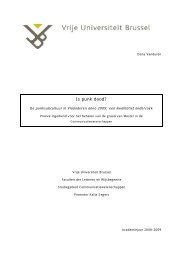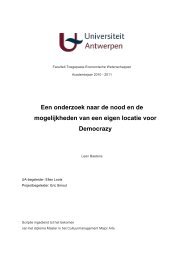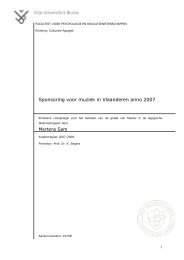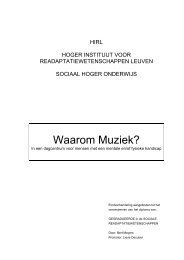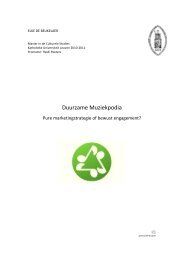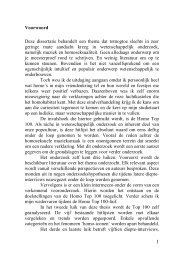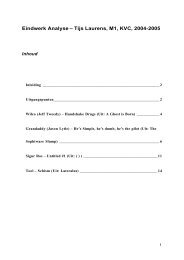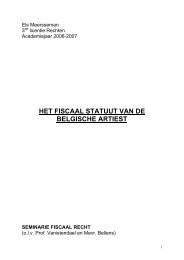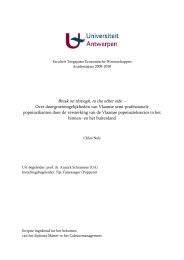Hip hop identity in a township reality. - Poppunt
Hip hop identity in a township reality. - Poppunt
Hip hop identity in a township reality. - Poppunt
You also want an ePaper? Increase the reach of your titles
YUMPU automatically turns print PDFs into web optimized ePapers that Google loves.
themselves was: what do bil<strong>in</strong>gual speakers ga<strong>in</strong> by convers<strong>in</strong>g <strong>in</strong> two languages<br />
(i.e. through code-switch<strong>in</strong>g)? Why do they not use just one language throughout<br />
the whole conversation? S<strong>in</strong>ce they are fully bil<strong>in</strong>gual or multil<strong>in</strong>gual, they are<br />
perfectly capable of hold<strong>in</strong>g a conversation <strong>in</strong> one language. Why do they make use<br />
of code-switch<strong>in</strong>g then? The answer is associated with the (social) <strong>identity</strong> of the<br />
speaker. Language is the <strong>in</strong>dex that refers to the <strong>identity</strong> that a person has at that<br />
moment. By mak<strong>in</strong>g use of the several languages from a personal repertoire, the<br />
speaker could be a member of different <strong>identity</strong> categories. So, when one speaks <strong>in</strong><br />
only one language, that person’s membership does not reach much further than<br />
one <strong>identity</strong> category. By us<strong>in</strong>g code-switch<strong>in</strong>g however, the membership is dual or<br />
complex. The conclusion of the researchers was that languages could be comb<strong>in</strong>ed<br />
with one another <strong>in</strong> a strategic way, as long as the speaker knows these languages.<br />
In other words: full bil<strong>in</strong>gualism is a prerequisite for know<strong>in</strong>g how to understand<br />
the symbolic implication of the languages that are used. All this can be extended to<br />
the viewpo<strong>in</strong>t of these researchers i.e. the negotiation of identities is the only or<br />
most important function of code-switch<strong>in</strong>g.<br />
This observation regard<strong>in</strong>g code-switch<strong>in</strong>g br<strong>in</strong>gs about a lot of implications and<br />
criticism, which we will attend to <strong>in</strong> the next part of our explanation.<br />
2.2. Criticism, ‘our’ op<strong>in</strong>ion and def<strong>in</strong>ition<br />
It is first necessary to focus attention on the shortcom<strong>in</strong>gs of the first def<strong>in</strong>ition<br />
(‘only perfect bil<strong>in</strong>guals are able to do’). We can start with the def<strong>in</strong>ition of the term<br />
code-switch<strong>in</strong>g. With<strong>in</strong> section 2.1, it is implied that only perfect bil<strong>in</strong>guals with full<br />
multil<strong>in</strong>gual skills are able to make use of code-switch<strong>in</strong>g. This is an <strong>in</strong>accurate<br />
way of th<strong>in</strong>k<strong>in</strong>g. Code-switch speakers are not necessarily speakers that are<br />
capable of produc<strong>in</strong>g unil<strong>in</strong>gual speech <strong>in</strong> each separate language they code-switch<br />
<strong>in</strong>. In other words speak<strong>in</strong>g a language does not automatically correspond with<br />
know<strong>in</strong>g a language. The question that needs to be asked here is: when does one<br />
actually know a language? For example, it is completely possible to mix some<br />
English words <strong>in</strong>to a stretch of speech, while not capable of hold<strong>in</strong>g a full<br />
conversation <strong>in</strong> English. Would such a case class as know<strong>in</strong>g how to speak<br />
English? In theory, it does, because some English words were used. But if an<br />
English sentence was created that did not make sense, this would not be accepted<br />
as hav<strong>in</strong>g knowledge of the English language. So, know<strong>in</strong>g and us<strong>in</strong>g are unstable



